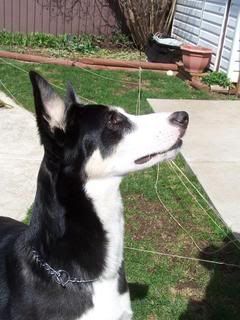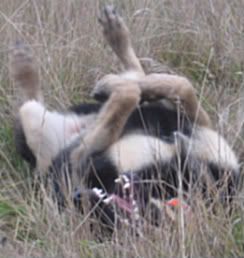Hi Michelle:
You’ve received a lot of great advice. I just wanted to throw a few of thoughts out there.
So even if I try to get her to say stop jumping my husbands buddies I have to have cheese in hand or she completely ignores me. I'm trying not giving her anything but then she continues to misbehave.
What happens when hubby’s buddies first come over? Some dogs are easily stimulated (or learn to be) at the arrival of guests and some guests are all too willing to enhance that stimulation. The sight of a friendly, somewhat timid, playful German Shepherd often gets folks into that silly football huddle stance, playfully egging the dog on (hopping and jumping around) while saying Hello.
I think you need to be clear in your mind about how you want your dog to be greeted and then take steps to achieve that. Inform the buddies that your dog is easily stimulated by the excitement of people coming over and you’re working on toning it down a bit. They could help you by ignoring the dog when entering the property and not acknowledging her until she is in a calm, relaxed state.
I’d have the pup on a leash observing the buddies’ arrival while she is in a “sit” position beside me. Reward her (nothing wrong with cheese) for paying attention to you - each time her focus/eye contact turns to you and away from the arriving guests. This will teach her the behavior you expect from her. Of course, if you’re involved in the greeting, the crate (when you get one) will be an ideal option when you’re not able to give her your full attention. In the meantime, informed guests are generally a great help with this type of training.
As well, even more important in this situation, when the BUDDIES are finally settled down, behaving calmly and engaged in relaxed, civil conversation, immediately present them with beer and nachos (double cheese). This will re-enforce the desired behavior you’d like to see from THEM as well as make it easier for the pup to settle. Trust me, it works.
she was bone and skin.
seemed to understand that she had done bad; "Bad girl. Go to bed and stay."; she was in trouble, she was slinking away
She’s only been with you a month. I’m sorry here but I must say “Bad Mommy”. Sounds like this girl has had her share of hungry times. Possibly being exposed to some starvation in the past - there isn’t much worse than the wafting aroma of a tasty meal, that could satisfy the excruciating hunger pains, and it never comes. I’m not in any way implying that you are part of this equation, but it may have been one of her experiences.
If I was going to have her in the kitchen with me while preparing food, knowing her “bone and skin” past, I would always make sure her little belly was full or at least have something in there to work on while she’s being exposed to the appetizing smells.
she offered no resistance in being hauled away; Fireman ….was swapping her with four other people; She is sweet but a touch insecure; she went happy crazy and was just crying her little heart out. I gave her a hug
It’s easy to see how this pup has developed separation issues and it’s causing a fair amount of anxiety. Connie has given you some great advice on the desensitization process. I would just like to also stress that she needs to be set up for complete success. She should never get to a whining, panicky state.
For an active 15 month old, I would ensure that she is well exercised (tired) and fed when you begin this process/training. I would start by occupying her with her a recreational item – eg: antler chew, kong or my favorite, an everlasting treat ball. When she’s nice and settled, enjoying herself, leave the room and return well before she starts to react to your absence.
During this training, I would return with a calm but engaging presence. In the beginning, you want her to know that you have returned for her and she will be rewarded for calm behavior. We often put a lot of emphasis on the leaving piece (and rightfully so), but to me, it’s what we do when we return that has the most impact. Once she starts to build trust that you are returning and it becomes routine, you can move away from the engagement to just returning, being a presence and going about your business (basically ignoring her).
Initially, when you return, she should be content with her recreational item. If you’re okay with removing toys/recreational items, I would then approach her, in a safe, non-threatening manner, remove it and engage her with my presence. If it’s true SA, YOU will be a high value reward. Run her through a couple of the obedience commands you are working on with low value rewards. (Remember, she’s a bit tired and probably wants her recreation item). After a minute of this, return her recreational item and leave for a minute or two longer this time, returning before she reacts. Again, remove the item and work on obedience for a minute or two. Believe me… a few repetitions of this and she’ll be looking forward to you leaving the room. She will start subconsciously forming a choice to be left alone. Again… this is just in the very beginning when you are starting to introduce the short term absences. Set her up for complete success and teach her that “alone” time can be very enjoyable and welcome. And as folks have mentioned, the crate will also be a great help when you get it.
start a little log ... of her poop
I hope I’m not the only one that got a little chuckle out of this EXCELLENT piece of advice. It’s critical to you becoming familiar with her routine.
I have nothing to add on the great advice you’ve received here, but would simply like to emphasize my agreement in that I would NEVER correct a dog (in any way – at any time) for natural body functions. It is my responsibility to monitor (start a little log

)and ensure that they are in an appropriate environment when it’s time for their little bodies to make a movement.
I really want her to be happy and to feel safe.
She’s had a tough start and needs some structure and fair guiding leadership to learn the ins and outs of her new home. Feeling safe and happy comes with consistency and trust. I’m sure you will get there.
I wish you the best of luck with her.
 Previous Topic
Previous Topic Index
Index Next Topic
Next Topic











 Top
Top









